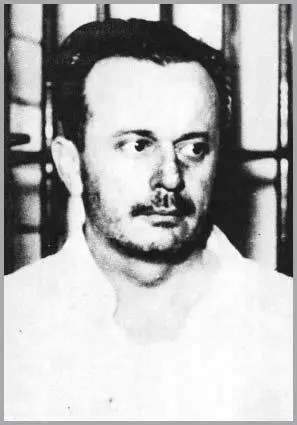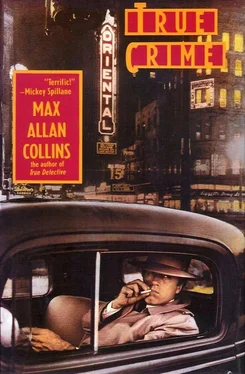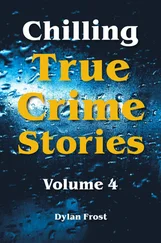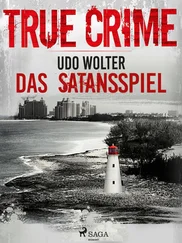She glared at me; we weren’t getting along as well today as yesterday. “That’s disreligious,” she said.
“I suppose it is.”
“What church do you go to?”
“None to speak of, Ma.”
She tsk-tsked. “That’s very sad. Very sad.”
“I suppose it is, Ma.”
“You’re sure to fry in eternal hell, you know.”
“I’ll have company.”
“What do you mean by that?”
“Nothing. Look up ahead.”
“Oooooh!” she squealed. “The bearded lady... tried a jar... she’s now a famous... movie star! Burma Shave! Haw haw!”
Sally hadn’t been crazy about my leaving on this little jaunt. In fact, she’d been downright angry.
“You really disappoint me, Nate. Really disappoint me!”
We were sitting at her breakfast table having coffee.
“Why is that, Helen?”
“I just thought you were smarter than — than to behave in such a suicidal fashion!”
“Suicidal.”
“Going out among those... crazy maniacs!”
“Most maniacs are a little crazy.”
“Right — like you!”
I’d made a big mistake: with the exception of Frank Nitti’s role and the Jimmy Lawrence cover, I’d told Sally the whole story — the farmer’s daughter in the clutches of the Barker gang, and how I was going undercover to bring her back alive, as Frank Buck would say.
“Don’t you see what you’re doing?”
“Yeah, I think so. A job.”
“You’re trying to... redeem yourself, in some childish way. You’ve been feeling so goddamn sorry for yourself, for the way you were used in the Dillinger shooting, that you’re looking for some way to build your self-respect back up. So you take on this ridiculous case! You go out among killers and thieves and risk your life for a few dollars, just to play knight and save the fair damsel-in-distress! Shit, you’ve gone simple on me.”
“Helen, it’s not just a few dollars. It’s the first real money I’ve seen all year, outside of that reward money.”
“I don’t see you denying you’ve gone simple.”
“I’ve always been just a simple soul. That’s what’s so adorable about me.”
“Don’t butter me up, you louse. Damn , this makes me mad! You ought to go running back to that — that little actress of yours in Hollywood — this is just her style... this is just the sort of romantic bullshit she’d fall for. Why don’t you call her on the phone, Heller — my treat! Long distance, person to person, Hollywood. My treat — my pleasure!”
I didn’t say anything.
Sally sighed; stirred her coffee absently. Then she looked up with wet eyes. “I’m sorry I said that.”
I sipped my coffee.
“I shouldn’t have mentioned her, should I?”
I shook my head no.
“It still hurts you, doesn’t it? Losing her.”
“Ever talk to an amputee?”
That startled her.
She said, “Not really.”
“Well, they say the worst thing about losing an arm, a leg, is that sometimes you can still feel it there. Even though it’s been cut off. In the night, for example, it itches sometimes. The limb that’s been cut off.”
“You are a sentimental dope, aren’t you, Heller?”
“Takes one to know one, Helen.”
A tear was gliding down her smooth, round right cheek. “Well, then, you sentimental dope, why don’t you mount your white horse and go riding off after your damn damsel. Shit! Why don’t you mount the nearest damsel instead... let’s go back to bed...”
“Let’s,” I said.
Later, she touched my shoulder and said, “I don’t know if I want to see you, when you get back.”
“Oh?”
“Maybe I want to let go of you now, so that... if something happens to you, it won’t hurt so bad.”
“It’s up to you, Sally.”
She looked hurt. “You called me Sally.”
“So I did. I’ll call you Helen again, if you let me back in, when this is over.”
She wept as I held her; when I left, later that morning, she was mad again. Not speaking.
“Beneath this stone... lies Elmer Gush... tickled to death... by a shavin’ brush! Haw haw! Burma Shave.”
“Beaver Falls,” I said.
“Huh?” Kate Barker said.
“That’s Beaver Falls, up ahead.”
We were on U.S. Highway 151, now, and it entered the little town along a shady street where two-story clapboard houses with front porches with pillars and swings, wide windows and pointed roofs, sat on big lawns, looking prosperous unless you noticed how many of them needed painting. We glided through the downtown, where the trees disappeared in favor of electric posts, and two-story brick buildings stared each other down on either side of Front Street — hardware store, boot shop, floral shop, tavern, J. C. Penney, movie house.
Ma turned around in her seat, as we passed, straining to look back. “What’s playin’? What’s playin’?”
“Huh?”
“At the movie house!”
“Oh.” I looked back; winced when I saw what it was. “ Manhattan Melodrama ,” I said.
“Oh,” she said, disappointed. “I seen that. I like Clark Gable, but not when he dies at the end.”
About four miles outside of Beaver Falls was a farm, the mailbox prominently marked gillis. I slowed and turned in the gravel drive. Chickens scooted out of my way. Over to the right was the two-story farmhouse, pretty good size, a swing on the pillared front porch, wide curtained windows, pointed gabled roof, much like the houses in Beaver Falls, only no curling paint. At the left and curving back behind the house were several other structures, among them an unpainted tool shed, a pump with windmill tower, a faded red barn, a silo.
There were no other autos around; I got out of the Auburn, went around and opened the door for Kate Barker. The lawn and house were fenced in with unbarbed wire, and a few pine trees were spread about the lawn in an undiscernible pattern, providing shade. Up on the porch of the house, the door opened and a small man in a rumpled white shirt and equally rumpled brown pants came down the steps quickly and Ma moved toward him.
“Arthur, Arthur,” Ma said hugging him to her; he was sort of stocky himself, but she still seemed to smother him, slapping him on the back. His hands clung loosely to her back, but he was glad to see her, too, saying, “Ma, gee, Ma, it’s good to see you...”
I was getting her bags out of the back when another small figure, in a white shirt and a bow tie and a dark unbuttoned vest and gray baggy pants, came bolting down the steps, feet making a clapping sound. The chickens on the lawn scattered. He had a tommy gun slung over his arm and I swallowed as he approached and pointed it at me. I felt like joining the other chickens.
“Who the hell are you?” he said. He sounded like Jimmy Cagney and I wondered if it was on purpose, maybe to offset his boyish features.
“I’m Jimmy Lawrence,” I said.
“Oh yeah?”
“Yeah. Who are you?”
“Don’t you know?” He laughed, like I was the dumbest shit he ever saw. He pointed a thumb back at himself. “I’m Big George.”
“Big George?”
“Nelson!” he said.
Baby Face Nelson said.

ARTHUR “DOC” BARKER
Ma let loose of her boy Arthur long enough to call out to Nelson: “He’s from Chicago.”
Nelson manufactured a sneer, over which the faint beginnings of a mustache were more threat than promise. “So am I. So what?”
“I’m here on an errand,” I said, “for Frank Nitti.”
The sneer faded, and he blinked. “Am I supposed to be impressed?”
Читать дальше













